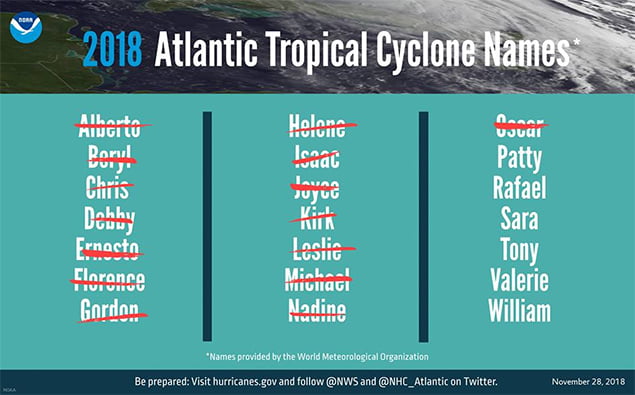The 2018 Atlantic hurricane season officially ends today Friday, November 30th. It will be remembered most for hurricanes Florence and Michael, which caused significant damage over the southeastern U.S. In total, the 2018 season produced 15 named storms, including eight hurricanes of which two were “major” (Category 3, 4 or 5). An average season has 12 named storms, six hurricanes, and three major hurricanes.
Storm-by-storm forecasts from NOAA’s National Hurricane Center were aided by the high-resolution imagery from NOAA’s new GOES-East satellite (GOES-16), and the American Global Forecast System (GFS) model. NOAA’s hurricane hunter aircraft flew more than 580 hours this season and provided valuable data in support of forecasting, research and emergency response.
For the fourth consecutive year, hurricane activity began prior to the official June 1st start of the season, with Tropical Storm Alberto forming on May 25. A record seven named storms (Alberto, Beryl, Debby, Ernesto, Joyce, Leslie and Oscar) were classified as subtropical at some point. All subtropical storms this season eventually transitioned into a tropical storm, with three (Beryl, Leslie and Oscar) eventually becoming hurricanes.
The major factors that supported theabove-normal activity in the North Atlantic was the presence of above-normal Sea Surface Temperatures. In the Caribbean and the Gulf of Mexico, the normal condition was supported by a strong vertical wind shear, this makes conditions less conducive for tropical cyclone development. Of the fifteen systems that formed during the season, Belize was blessed to have not been affected by any. However, two areas of low pressure came within our area of concern, which raise alertness of the National Meteorological Service. One of these areas of low pressure went on to become Hurricane Michael.
Although today marks the closure of the 2018 Atlantic Basin Hurricane season, history teaches us that systems do form outside of the seasons. One example is Tropical Storm Alberto that formed in May of 2018. The National Meteorological Service takes this time to ask each and every one to do a review of their 2018 hurricane plan to see their weaknesses and short-falls, so they can be better prepared if need arises in 2019. Now is the time to make note of ways to improve family hurricane plans for next year. The 2019 hurricane season will officially begin on June 1 and NOAA’s Climate Prediction Center will provide its initial seasonal outlook in May
The staff at the Belize National Meteorological Service will continue to do its utmost best to disseminate reliable information in a timely and user-friendly manner to the Belizean public in the case of any weather-related emergency. The service remains committed in its mission of keeping the Belizean public well informed of any weather event that may affect their well-being and/or may affect the sustainable development of the nation

Click Here for More Ambergris Today News Online











